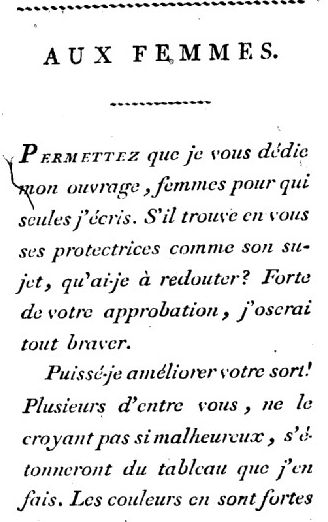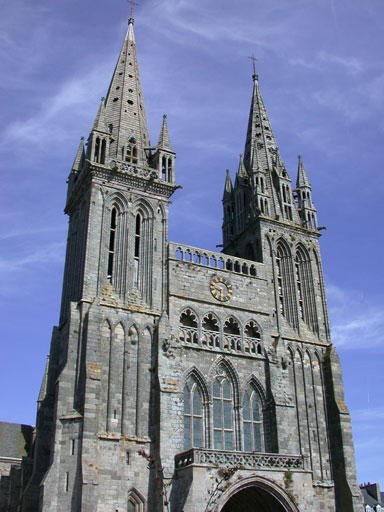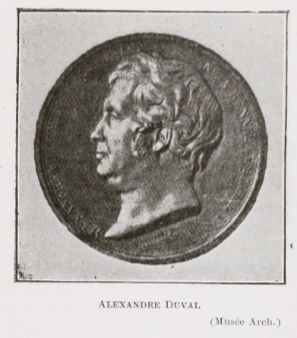|
Fanny Raoul
Marie-Françoise Raoul, known as Fanny Raoul (born in Saint-Pol-de-Léon on December 19, 1771, and died in Paris on December 9, 1833) was a French feminist writer, journalist, philosopher and essayist. Early life and education Little is known about the life of Marie-Françoise (nickname, "Fanny") Raoul. The editor of Raoul's essay, as well as the record of the Bibliothèque nationale de France indicate 1771 as the year of her birth, while the biographical dictionary of Joseph-Marie Quérard, indicates 20 December 1779. Her mother, daughter of the organist of Saint-Pol-de-Léon, died while giving birth to Fanny. Her father, Claude-René Raoul, was first a notary, then a prosecutor of the bishopric, the first alderman of Saint-Pol-de-Léon and finally, a commissioner of the court of Morlaix after the revolution. He gave his daughter a solid and open intellectual education, being her first reader and advisor. Raoul moved to Paris where she frequented the salons of Thérésa Talli ... [...More Info...] [...Related Items...] OR: [Wikipedia] [Google] [Baidu] |
Saint-Pol-de-Léon
Saint-Pol-de-Léon (; br, Kastell-Paol) is a commune in the Finistère department in Brittany in north-western France, located on the coast. It is noted for its 13th-century cathedral on the site of the original founded by Saint Paul Aurelian in the 6th century. It has kept a unique architecture, such as Notre-Dame du Kreisker Chapel, an 80 m high chapel, which is the highest in Brittany. It was also the scene of a battle during the Breton War of Succession, where the Montfortists and their English allies defeated an army led by Charles of Blois. It is the largest vegetable producer and farmers market in Brittany responsible for 90% of French artichoke production and exports tens of thousands of vegetables to the whole of Europe every year. Population Inhabitants of Saint-Pol-de-Léon are called ''Saintpolitains''. History The city takes its present name of one of the legendary founder saints of Brittany: Saint Paul Aurelian. The Latin name given to the entire region is ... [...More Info...] [...Related Items...] OR: [Wikipedia] [Google] [Baidu] |
Bretons
The Bretons (; br, Bretoned or ''Vretoned,'' ) are a Celts, Celtic ethnic group native to Brittany. They trace much of their heritage to groups of Common Brittonic, Brittonic speakers who emigrated from Dumnonia, southwestern Great Britain, particularly Cornwall and Devon, mostly during the Anglo-Saxon settlement of Britain. They migrated in waves from the 3rd to 9th century (most heavily from 450 to 600) into Armorica, which was subsequently named Brittany after them. The main traditional language of Brittany is Breton language, Breton (''Brezhoneg''), spoken in Lower Brittany (i.e., the western part of the peninsula). Breton is spoken by around 206,000 people as of 2013. The other principal minority language of Brittany is Gallo language, Gallo; Gallo is spoken only in Upper Brittany, where Breton is less dominant. As one of the Brittonic languages, Breton is related closely to Cornish language, Cornish and more distantly to Welsh language, Welsh, while the Gallo language is o ... [...More Info...] [...Related Items...] OR: [Wikipedia] [Google] [Baidu] |
Plagiarism
Plagiarism is the fraudulent representation of another person's language, thoughts, ideas, or expressions as one's own original work.From the 1995 '' Random House Compact Unabridged Dictionary'': use or close imitation of the language and thoughts of another author and the representation of them as one's own original work qtd. in From the Oxford English Dictionary: The action or practice of taking someone else's work, idea, etc., and passing it off as one's own; literary theft. While precise definitions vary, depending on the institution, such representations are generally considered to violate academic integrity and journalistic ethics as well as social norms of learning, teaching, research, fairness, respect and responsibility in many cultures. It is subject to sanctions such as penalties, suspension, expulsion from school or work, substantial fines and even imprisonment. Plagiarism is typically not in itself a crime, but like counterfeiting, fraud can be punished in a court f ... [...More Info...] [...Related Items...] OR: [Wikipedia] [Google] [Baidu] |
Odéon-Théâtre De L'Europe
The Odéon-Théâtre de l'Europe ( en, European Music Hall) (formerly the Théâtre de l'Odéon ( en, Music Hall)) is one of France's six national theatres. It is located at 2 rue Corneille in the 6th arrondissement of Paris on the left bank of the Seine, next to the Luxembourg Garden and the Luxembourg Palace, which houses the Senate. First theatre The original building, the Salle du Faubourg Saint-Germain, was constructed for the Théâtre Français between 1779 and 1782 to a Neoclassical design by Charles De Wailly and Marie-Joseph Peyre. The site was in the garden of the former Hôtel de Condé. The new theatre was inaugurated by Marie-Antoinette on April 9, 1782. It was there that Beaumarchais' play ''The Marriage of Figaro'' was premiered two years later. On April 27, 1791, during the Revolution, the company split. The players sympathetic to the crown remained in the theatre in the Faubourg Saint-Germain. They were arrested and incarcerated on the night of September 3, ... [...More Info...] [...Related Items...] OR: [Wikipedia] [Google] [Baidu] |
Académie Française
An academy (Attic Greek: Ἀκαδήμεια; Koine Greek Ἀκαδημία) is an institution of secondary education, secondary or tertiary education, tertiary higher education, higher learning (and generally also research or honorary membership). The name traces back to Plato's school of philosophy, founded approximately 385 BC at Akademia, a sanctuary of Athena, the goddess of wisdom and Skills, skill, north of Ancient Athens, Athens, Greece. Etymology The word comes from the ''Academy'' in ancient Greece, which derives from the Athenian hero, ''Akademos''. Outside the city walls of Athens, the Gymnasium (ancient Greece), gymnasium was made famous by Plato as a center of learning. The sacred space, dedicated to the goddess of wisdom, Athena, had formerly been an olive Grove (nature), grove, hence the expression "the groves of Academe". In these gardens, the philosopher Plato conversed with followers. Plato developed his sessions into a method of teaching philosophy and in 3 ... [...More Info...] [...Related Items...] OR: [Wikipedia] [Google] [Baidu] |
Alexandre-Vincent Pineux Duval
Alexandre-Vincent Pineux Duval (6 April 1767, in Rennes – 1 September 1842, in Paris) was a French dramatist, sailor, architect, actor, theatre manager. He was the eighth member elected to occupy seat 4 of the Académie française in 1812. Duval was brother to the diplomat Amaury Duval (1760–1838). Bibliography * ''Les Projets de mariage'' (1790) * ''Les Tuteurs vengés'' (1794) *''La Manie d'être quelque chose'' (1795) *''Le Défenseur officieux'' (1795) *''La Jeunesse de Richelieu'' (1796) *''Les Héritiers ou le Naufrage'', comédie en 1 acte et en prose (représentée pour la première fois le 27 novembre 1796) *''Maison à vendre'' (1800) ; *''Édouard en Écosse'' (1801), en 3 actes et en prose *''Guillaume le Conquérant'' (1803) *''Shakespeare amoureux'' (1804) *''Le Menuisier de Livonie'' (1805) *''Le Tyran domestique'', en 5 actes et en vers (1805) *''La Jeunesse d'Henri V'', en 3 actes (1806) *''Le faux Stanislas'' (1809) *''Le Chevalier d'industrie'' en 5 ... [...More Info...] [...Related Items...] OR: [Wikipedia] [Google] [Baidu] |
Epistolary Novel
An epistolary novel is a novel written as a series of letters. The term is often extended to cover novels that intersperse documents of other kinds with the letters, most commonly diary entries and newspaper clippings, and sometimes considered to include novels composed of documents even if they don't include letters at all. More recently, epistolaries may include electronic documents such as recordings and radio, blog posts, and e-mails. The word ''epistolary'' is derived from Latin from the Greek word ἐπιστολή ''epistolē'', meaning a letter (see epistle). In German, this type of novel is known as a Briefroman. The epistolary form can add greater realism to a story, because it mimics the workings of real life. It is thus able to demonstrate differing points of view without recourse to the device of an omniscient narrator. An important strategic device in the epistolary novel for creating the impression of authenticity of the letters is the fictional editor. Early ... [...More Info...] [...Related Items...] OR: [Wikipedia] [Google] [Baidu] |
Black People
Black is a racialized classification of people, usually a political and skin color-based category for specific populations with a mid to dark brown complexion. Not all people considered "black" have dark skin; in certain countries, often in socially based systems of racial classification in the Western world, the term "black" is used to describe persons who are perceived as dark-skinned compared to other populations. It is most commonly used for people of sub-Saharan African ancestry and the indigenous peoples of Oceania, though it has been applied in many contexts to other groups, and is no indicator of any close ancestral relationship whatsoever. Indigenous African societies do not use the term ''black'' as a racial identity outside of influences brought by Western cultures. The term "black" may or may not be capitalized. The '' AP Stylebook'' changed its guide to capitalize the "b" in ''black'' in 2020. The '' ASA Style Guide'' says that the "b" should not be capitalized. S ... [...More Info...] [...Related Items...] OR: [Wikipedia] [Google] [Baidu] |
François Poullain De La Barre
François Poullain de la Barre (; July 1647 – 4 May 1723) was an author, Catholic priest, and a Cartesian philosopher. Life François Poullain de la Barre was born on July 1647 in Paris, France, to a family with judicial nobility. He added "de la Barre" to his name later in life. After graduating in 1663 with a master of arts, he spent three years at the College of Sorbonne where he studied theology. In 1679, he became an ordained Catholic priest. From 1679 to 1688, he led two modest parishes, Versigny and La Flamengrie, in Picardy in northern France. In 1688, Poullaine de la Barre left Picardy and the priesthood to return to Paris. At the time the Catholic Church was critical of Cartesianism. By 1689 he moved to Geneva where he converted to Calvinism, a branch of Protestantism. The following year, he married Marie Ravier. After a year as a tutor, he got a position teaching at a local Genevan university. After the Edict of Fontainebleau revoked the Edict of Nantes, he was exile ... [...More Info...] [...Related Items...] OR: [Wikipedia] [Google] [Baidu] |
Marie Desplechin
Marie Desplechin (born Roubaix, Nord, 7 January 1959) is a French writer. She studied literature and journalism before becoming a writer. She is the author of several children's novels and ''Taking it to Heart'', a collection of short stories. ''Sans Moi'', her first novel, has been a great success in France, where it has sold over 120,000 copies. She won the Prix Médicis The Prix Médicis is a French literary award given each year in November. It was founded in 1958 by and . It is awarded to an author whose "fame does not yet match his talent." The award goes to a work of fiction in the French language. In 19 ... in 2005 for her book, ''La vie sauve''. References * * * 1959 births Living people People from Roubaix Writers from Nord (French department) French women novelists Prix Médicis essai winners {{France-novelist-20thC-stub ... [...More Info...] [...Related Items...] OR: [Wikipedia] [Google] [Baidu] |
Geneviève Fraisse
Geneviève Fraisse (born October 7, 1948, Paris) is a French people, French feminist philosopher. Early life She was born within ''Murs blancs'' ("White walls"), a community founded by Emmanuel Mounier at Châtenay-Malabry. Her parents, Paul Fraisse (an author of books of experimental psychology) and Simone Fraisse (an author of books on Charles Péguy, Ernest Renan, and Simone Weil), were both professors at the Sorbonne. In May 1968, she is a first year philosophy student at the Sorbonne. She co-funded with Jacques Rancière the journal ''Les Révoltes logiques'' ("Logical revolts"). Career Author of around 20 books, her work focuses on the political epistemology of feminist thought. Her research led her to postulate concepts on the "domestic service", "exclusive democracy," "women's reason", the "two governments", the "mixing of the sexes", "habeas corpus" and "consent". The complexity of the debate on gender led her to work closely with the historians, particularly on the synt ... [...More Info...] [...Related Items...] OR: [Wikipedia] [Google] [Baidu] |








